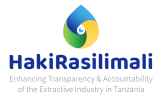We, HakiRasilimali, a platform of Civil Society Organizations (CSOs) working on strategic issues around minerals, oil and gas extraction in Tanzania, having shared experiences on the problems facing Tanzania and other African countries at the 5th Tanzania Extractive Industries Conference held in Dodoma on the 2nd and 3rd of November, 2017:
- Affirm that resources of the country are primarily for the benefit of the people of Tanzania in accordance with the constitution. Hence citizens should be the ultimate holders of their natural resources and hence should be actively involved in the entire extractive value chain from the decision to extract to the decision on how the revenues will be spent. And the government of Tanzania shall therefore remain the custodian acting on behalf of the people.
- Recognize that parliamentary oversight committees are crucial to ensuring independent scrutiny and providing oversight on how the executive manages natural resource wealth in Tanzania. Thus, the Parliament should be progressively empowered through provision of baseline knowledge on extractive issues to scrutinize the management of mining, oil and natural gas resources. Moreover, we acknowledge that enhancing the independence of parliamentary committees requires legislative improvements and there is a need to revamp the provisions of the legislation to provide legislative authority to ratify all agreements between governments and companies. On the other hand, the Parliament in collaboration with the government, is responsible for ensuring that law enforcement does not limit or restrict the full functioning of other institutions such as the Tanzania Revenue Authority (TRA). Existing gaps within the law has opened space for extractive companies to avoid paying taxes.
- Call on all Government pillars to promote the implementation of policies that are beneficial to the country. It is imperious that policy and law enforcement measures will be accompanied by the provision of access to accurate information to Tanzanians and relevant stakeholders like CSOs and private organizations at the right time. This will provide sufficient time for the stakeholders to critically and effectively engage in the dialogue processes and discussions to enhance change of reforms that will better govern the extractive sector in Tanzania. In line with the above, it is proposed that regulations should be drafted to help eliminate conflicts in relevant law enforcement such as the environmental law. An example where the law should be used in managing or evaluating the conduct of mining companies before and after extraction sessions, to answer the following questions (to what extent are extractive companies allowed to destroy the environment including water and natural sources? What role do they play in improving the environment while there is an overflowing process for extraction?).
- Call on CSOs in the country to continue to educate citizens and communities about issues related to their development and well-being, aimed at increasing the power and public voice. This role should not be neglected or disrespected, as it contributes to creating a community with understanding and the power to question various aspects of current and private development.
- Noted that there are many potential opportunities for the government to provide more co-operative opportunities and dialogue between extractive investors, who are working for massage operations, middle miners, miners and communities around the mining and gas extraction. Among the benefits of doing this, is to create positive and productive relationships among stakeholders of the relevant sector. This means building peace and reducing conflict relationships that could cause destruction and then loss of property or loss of lives in the extractive operation areas.
- Call for the government to provide opportunities for citizens at different levels, to discuss and comment on the resources of their country without threat. Enable the creation of a reporting system and feedback on the decisions that take place especially regarding the planning process.
- Recognize the need for more empowerment for Tanzanians to make good use of opportunities derived from mining, oil and gas. By using technical colleges and universities that offer research, graduation and value-added research to fully participate in managing and benefiting from exposure to extraction. However, the government should not only look at the advantages of sectoral production programs alone, but should focus on the inter-relationships between institutions and different sectors. This will improve the investment environment among various sectors for sustainable development and growth of the economy of the country. For example is the agriculture sector and mining industry could be a better means to help the communities in stimulating their sources of income and providing alternative employment while production in the extractives declines.
- Acknowledged that there are many benefits derived from partnerships between neighboring countries. In order to build and ensure beneficial competition between our neighbors Kenya and Uganda , it is recommended that a joint venture needs to be developed that will address the natural resources matters among East Africa member states. Among the things that the venture could deal with is the balancing of the resources market prices.
HakiRasilimali is an official affiliation to Publish What You Pay (PWYP) in Tanzania. PWYP is a global membership-based coalition of civil society organizations (CSOs) in over 40 countries united in their call for an open and accountable extractive sector, so that oil, gas and mining revenues improve the livelihoods in resource-rich countries.
Prepared by
HakiRasilimali Secretariat


